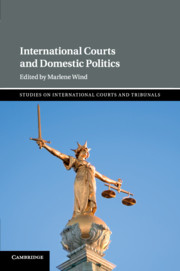Book contents
- International Courts and Domestic Politics
- Studies on International Courts and Tribunals
- International Courts and Domestic Politics
- Copyright page
- Contents
- Figures
- Tables
- Contributors
- Abbreviations
- Preface
- Introduction
- 1 ‘Missing in Action? The Rare Voice of International Courts in Domestic Politics’
- Part I
- Part II
- 8 Ideology and International Human Rights Commitments in Post-Communist Regimes: The Cases of the Czech Republic and Slovakia
- 9 Escalation and Interaction: International Courts and Domestic Politics in the Law of State Immunity
- 10 National Parliaments: Obstacles or Aid to the Impact of International Human Rights Bodies?
- 11 The European Court of Human Rights and Swiss Politics: How Does the Swiss Judge Fit In?
- 12 The Use of International Jurisprudence by Israel’s Supreme Court
- 13 Laggards or Pioneers? When Scandinavian Avant-garde Judges Do Not Cite International Case Law: A Methodological Framework
- Index
- References
9 - Escalation and Interaction: International Courts and Domestic Politics in the Law of State Immunity
from Part II
Published online by Cambridge University Press: 23 June 2018
- International Courts and Domestic Politics
- Studies on International Courts and Tribunals
- International Courts and Domestic Politics
- Copyright page
- Contents
- Figures
- Tables
- Contributors
- Abbreviations
- Preface
- Introduction
- 1 ‘Missing in Action? The Rare Voice of International Courts in Domestic Politics’
- Part I
- Part II
- 8 Ideology and International Human Rights Commitments in Post-Communist Regimes: The Cases of the Czech Republic and Slovakia
- 9 Escalation and Interaction: International Courts and Domestic Politics in the Law of State Immunity
- 10 National Parliaments: Obstacles or Aid to the Impact of International Human Rights Bodies?
- 11 The European Court of Human Rights and Swiss Politics: How Does the Swiss Judge Fit In?
- 12 The Use of International Jurisprudence by Israel’s Supreme Court
- 13 Laggards or Pioneers? When Scandinavian Avant-garde Judges Do Not Cite International Case Law: A Methodological Framework
- Index
- References
Summary
The law of State immunity is at the intersection of international law and domestic politics. It is a salient case study of this relationship because of the competing claims to authority that are inherent to each dispute. This chapter uses two international decisions – the 2012 International Court of Justice judgment in Jurisdictional Immunities of the State (Germany v. Italy, Greece intervening) and the 2014 judgment of the Fourth Chamber of the European Court of Human Rights in Jones and Ors v. United Kingdom – to analyse the concepts of escalation and interaction. The increased use of international courts by domestic actors in disputes over immunity is interesting but perhaps not surprising given the overall rise in the availability and use of third-party dispute settlement mechanisms. The greater puzzle lies in the varied reactions to international decisions, ranging from compliance to resistance, and the variables that condition such reactions. It seems that the existence of a conflicting constitutional norm may play an important role. The chapter concludes that Delmas-Marty’s concept of pluralism ordonné may be a way to conceptualise and develop procedural mechanisms of reciprocal restraint, respect and cooperation needed to adjust the competing claims of authority in this area.
- Type
- Chapter
- Information
- International Courts and Domestic Politics , pp. 206 - 226Publisher: Cambridge University PressPrint publication year: 2018



